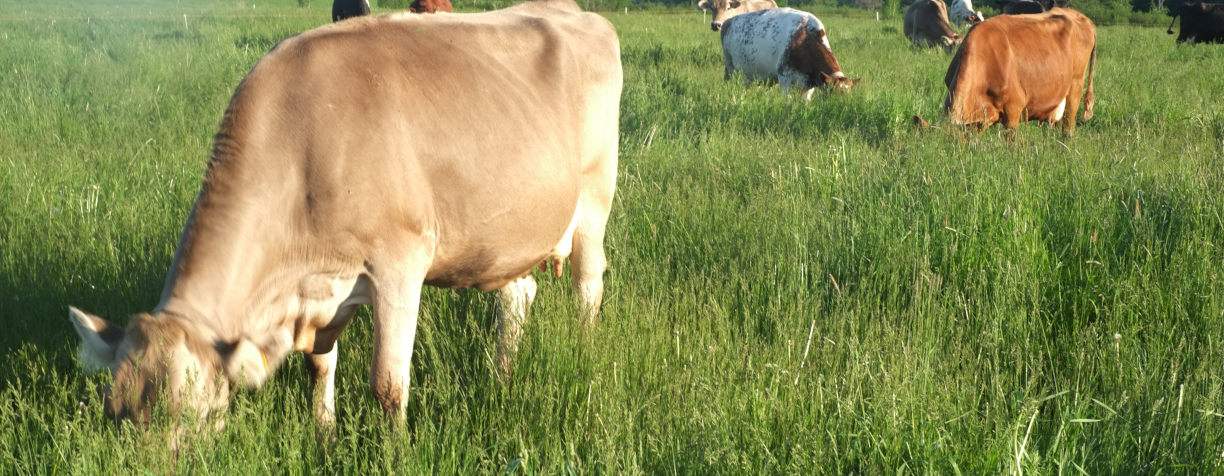Ken Sury
Farmer Veteran Coalition
Bob Miller resigned his commission as an Army captain in 2009 to start a creamery on his family’s dairy farm in rural Maryland as a way to make money selling the milk they produced.
Since then he’s bought the farm from his parents, converted the herd to purebred A2/A2 Jerseys, and uses his knowledge of no-till grazing to provide a superior quality milk that is popular with customers.
Bob’s family has pastured dairy cows on a 201-acre farm since 1989 in American Corner, Maryland, after his parents moved there from the farm they leased in New Jersey.
“One of the reasons why we moved was that my parents really wanted to go with the (rotational) grazing concept, so we looked for farms that they could purchase so that as they made their changes it was their land,” he said.
“We know a lot about grazing, and we’ve been grazing, we like to say, before it was cool,” Bob said. “And I will say that grazing for milk versus meat is a lot different. You see a lot of things out there on grazing beef, which is great. But at the same time, when you’re trying to milk a cow, it requires a little different take on grazing. I think that’s a unique aspect that we are focusing on here.”
Sharing Knowledge
The Army Veteran is also willing to share what he knows as a mentor with Dairy Grazing Apprenticeship, for which DGA apprenticeship manager Jessica Matthews is grateful.
“He understands some of the unique challenges that come along with running a farm correctly, the resiliency that needs to be involved, and this is someone who really values teaching others, which is really the most important thing in a mentor,” she said. “
Jessica went through the program herself as an apprentice and a journey worker. She was DGA’s education coordinator before taking over as apprenticeship manager last year.
Bob served in the Army from 2004 to 2009. He had served with the 10th Mountain Division and spent two tours in Iraq.
He was in the National Guard for a bit while setting up the creamery, which was built by their own hands. The creamery produces whole and skim milk, chocolate milk, butter, yogurt and ice cream with some home delivery but primarily to farmers markets and some retail stores.
Nice Farms Creamery is named for his grandfather, Leon Nice.
Getting apprentices through DGA willing to learn and helping him with the farm is a great benefit, Bob said.
“People are used to chickens and, you know, field work, but they’re not used to milking cows, being close to a cow, mucking stalls, things like that; it’s just different,” Bob said. “DGA looked like a great opportunity where you had a pool of people that were interested in dairy farming, and in particular grazing.”
Making Adjustments
Changing his herd to purebred A2/A2 Jerseys has served the farm and creamery well, Bob said.
“(My parents) did a lot of crossbreeding, but we feel that the Jersey breed is the best breed for grazing,” Bob said. “And we wanted to rapidly go from a mixed herd to a Jersey herd.
“In literally two years’ time, we went from the herd of my parents to building a foundation herd, and now going into our sixth year, breeding wonderful Jerseys, purebred Jerseys, here. That took a lot of work.
“And in addition to the grazing merits and their dairy merits, we also considered A2/A2 proteins, which, allows more people to drink milk, I think. It just, there’s a lot of good evidence, good research out there that it’s just more digestible for more people. So we’re very proud of that.”
The Dairy Grazing Apprenticeship supports mentor farmers who are willing to teach the next generation of farmers, Jessica said.
“That can look different for every farm,” she added. “Some farms it allows a mid-level career farmer to move up into more of an ownership position. Some farms are eager to transfer ownership of their farm and don’t have anybody in their family who’s interested in taking it.
“Some farmers are looking for herd managers so that they can take more time out of the barn to either spend with their family or move on to other things like looking for funding for their farm or some higher-level projects that they’ve been meaning to work on.
“So it can be different for everybody, but we try to match up the mentor’s goals with the apprentice’s goals and really push for transparency and clarity and expectations with the pairs.”
Bob said the transition from military to farming makes sense for a lot of Veterans.
“It takes a lot of discipline to be able to be a good soldier and it takes a lot of discipline to be a good farmer,” Bob said. “This is a duty.”


